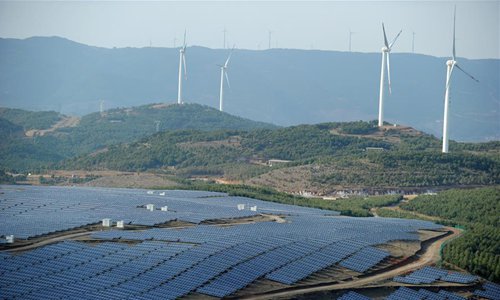HOME >> CHINA
China’s first environment chief content with progress
Source:Global Times-Agencies Published: 2019/9/14 10:33:59 Last Updated: 2019/9/14 12:51:50

Photo:Xinhua
Qu Geping, 89, became China's first environment protection chief in 1987, when the bureau of environment protection was founded. The bureau has become the current Ministry of Environment and Ecology (MEE).
Qu began his environmental protection career in the 1970s, when there was not much awareness in China of this concept.
Over the past decades, Qu has witnessed the difficulties faced by China in this area. He likens the struggle to the legend of Sisyphus pushing the giant stone to the peak.
Luckily, China's environmental protection efforts are on the right track.
"I have been working in the environment sector for almost 50 years, and had never seen such a good situation as there is now," Qu said in an interview with the Southern Weekly. The report was posted on the official website of the MEE.
Revealing pollution
Qu was a member of the first Chinese government delegation to the first United Nations Environment Program, the first director of the Chinese environmental protection bureau and Department of Resource Conservation and Environmental Protection.
However, he does not like people calling him "the father of Chinese environmental protection," as he believes that title should be given to former Chinese premier Zhou Enlai, who set China on the road to environmental protection.
Looking back, Qu said that environmental protection work in China has been "extremely difficult."
Although he has spent his entire career in the field, he believes he entered the sector by accident.
Qu first learned about environmental issues and its effects on social and economic development in 1972 in Stockholm, Sweden, during the United Nations Conference on the Human Environment. That was when Qu realized the potential threat that environmental problems posed to China, CCTV reported.
The first national environmental protection conference was held in 1973. Even back then, the situation in China was severe. "Air pollution, water pollution, garbage, chemical pollution… it was already very serious," Qu said.
However, Chinese people at that time did not have a clue about the concept of "environmental protection."
Back in the 1960s and 1970s, Chinese people believed there was no pollution in China. But in reality, Guanting Reservoir and Baiyangdian Lake near Beijing, as well as the famous Lijiang River in Guilin, South China's Guangxi Zhuang Autonomous Region, were all severely polluted, Qu said, the China Youth Daily reported.
Qu and the organizers of the conference distributed a document revealing the environmental problems in China. The facts shocked the attendants, and that was the beginning of China's pollution management drive.
Facing the truth
In the early 1980s, Qu decided to report the truth of the environmental problem situation to the central government, the China Youth Daily reported.
After a bold investigation, he handed in some "terrifying" data, indicating that environmental pollution and ecological damage were resulting in annual economic losses of 95 billion yuan at that time in China, accounting for 14 percent of output value. "Environmental problems had become a great barrier and threat to domestic economic development."
Because of the report, former vice premier Wan Li decided to hold another national environmental protection conference in 1983, calling for the whole of society to pay attention to environmental issues.
In January 1984, environmental protection became a basic condition and strategic task for China's modernization construction, as well as an important national policy.
In 1987, Qu became the first chief of the national environment protection bureau.
During Qu's career at the front line of battling pollution and protecting the environment, he put forward the idea that economic, urban-rural and environment construction should be developed at the same pace.
He also initiated the environmental system of "those who pollute must resolve," which became the foundation of environmental management in China. At the same time, he made great efforts in promoting legislation for environmental and resource protection.
"The environment is different from other departments. It's very broad," Qu said, "It involves every industry in the economy. It was impossible to imagine that [to protect the environment], key companies, governmental departments and regions all had to take action."
A better time
Qu remembered that during a national air pollution resolution conference in Taiyuan, North China's Shanxi Province in 1987, pollution was severe in China.
"An attendant told me that he rode a bicycle to his workplace, which took 30 minutes. Without glasses, dust would often enter his eyes after the ride. With glasses, his face would become like a 'panda.' His trousers were also covered with dust."
In the interview with the Southern Weekly earlier this year, Qu admitted that there are still many places where China falls short on the environment, but protection quality has improved a great deal around the country.
"Today in Taiyuan, even if a shirt is left outside for three to five days, it would not be dirtier than a shirt left outside for one hour in 1980s. This is an achievement that makes environment protectors like me relieved," he said.
Since the 18th Communist Party of China National Congress in 2012, environmental protection work has been placed in a central position in the government's key strategies, Qu said. "The change is massive."
In his opinion, only with national-level attention and investment can environment and ecology work be guaranteed.
"Comparing the past and now, we can all see the change. I am optimistic," he said.
Qu is also one of the pioneers of environmental protection education, making great contributions to developing higher education, professional education and public education on the environment.
On June 15, a symposium themed "Qu Geping devoted to environmental protection for 50 years" was held at Beijing's Tsinghua University, according to the website of the university.
"The generation of environmental protectors like me has no regrets about what we have done, and we are confident about the future," Qu said.
Global Times - Agencies
Posted in: IN-DEPTH